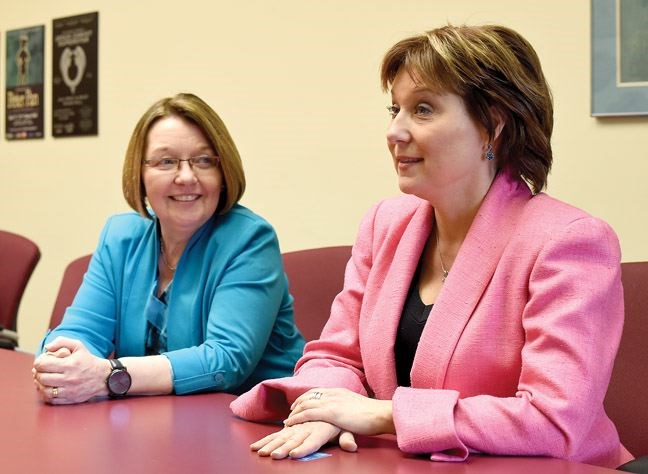Part 1 in a two-part series
Scoring some big natural resources goals and advancing aboriginal relations to unprecedented levels will be the primary focus of the provincial government in the coming year.
Christy Clark gave some of the details at a meeting on Tuesday with members of the Prince George Citizen editorial staff in the first such roundtable here since the 2013 election campaign that brought her back for a second term as B.C.'s premier.
Only about a year away from the next campaign, she indicated the next election would be based on accomplishments in northern B.C. she intended to execute on in 2016.
The top of that priority list for her was the softwood lumber agreement. Canada and the United States do not have a current trade pact for selling B.C.'s most important commodity (primarily spruce, fir and pine).
Lumber is being sold into the States based on the terms of the previous agreement that expired this past year. It is a federal issue, but no province has more at stake than British Columbia.
"The first thing I ever said to (Justin Trudeau) when he became prime minister was we need you to help us settle the softwood lumber deal, because we know it only gets settled by a prime minister and president talking to each other. We ship 50 per cent of the softwood from Canada, as you know, so it's more important to British Columbia than anywhere else.
"And good on him, he got it done. He got it on the agenda. That was the result of a lot of work by a lot of us. Shirley (Bond, Minister of Jobs, Tourism, Skills Training and Labour, who was seated alongside Clark for this discussion) and her colleagues, when they would talk to their federal counterparts, it was all softwood, all the time. The prime minister, we are grateful, he put it on the agenda with the president, and even better than that, he set a 100-day deadline.
"The president comes up to Canada in 100 days for his state dinner, and our assumption is they intend to have it solved by the time he comes up. But that's what it takes - it takes the political commitment of the president of the United States to get this done. I don't think we could have hoped for better from the federal government on this one; they did a really good job."
It will take a lot of compromise still, said Clark, and some difficult discussions are ahead, "but it is better than a trade war" which is how the softwood scenario has been in the past.
The conversation has not been been changed by the burgeoning markets now open to Canadian softwood in China, Japan is buying like never before, and places like India are showing keen signs of interest.
That creates a broader range of market options for the lumber producers, but the United States is still Canada's most lucrative and loyal customer for wood products, and the negotiations will have nothing to do with what other countries have agreed to.
Another set of discussions is underway, most of them in board rooms far from Canada, as to which companies will go ahead and invest in a full-service LNG system in northern B.C.
About a dozen proponents are giving a look to setting up shop (that entails a gas extraction operation in northeastern B.C., a pipeline across the map to the coast, and a shipping facility somewhere in the Kitimat / Prince Rupert area).
Some proponents are farther ahead in provincial permitting and First Nations consultations than others.
"I'm done with predictions," Clark laughed. The unanticipated drop in global oil prices had a cooling effect on the liquefied natural gas fortunes of the world, as well, so plans that were rocketing ahead in B.C. slowed accordingly.
"Shell has confirmed they will do their final investment decision sometime by the end of 2016. We think Petronas will be sooner."
Those, too, require federal approvals due to the complex environmental assurances that must be established with the national watchdogs.
If the proponent companies deliver on those requirements, and Ottawa gives the green light, it is then up to the companies themselves if they want to actually pull the trigger.
Shell and Petronas have indicated their strong desires to do so, said Clark, but with oil prices so low it has caused a domino effect of companies buying and selling each other, some closing, some shifting priorities, so the market trends of 2012-13 are no longer applicable.
It doesn't kill any B.C. deals, but it does distort predictability.
"It is a lot of jobs for Canadians - 100,000 jobs in B.C. over 30 years - and more importantly a trillion dollars in economic growth for the country," she said.
It is also in the hands of the federal government to stimulate the aboriginal treaty process.
Clark talked about provincial agreements with First Nations on items like forestry and natural gas - items within the jurisdiction of a province - but for the full treaty process to manifest, there must, by law, be a third participant at the table of compromise.
"Over the years they (the feds) have been very slow and reluctant, I think, to engage deeply," said Clark.
"This federal government has shown every sign that they want to. They are just starting, but I think that they will, and having them at the table will make all the difference."
The joining of provincial and First Nations forces will be discussed in more detail in the next installment of this conversation between Premier Christy Clark and the Prince George Citizen.



